反义疑问句
反义疑问句 英语

反义疑问句英语【30条】反义疑问句(tag question)通常由一个陈述句和一个由助动词、主语和否定词构成的短语组成,用于征求听者的同意或确认。
反义疑问句的形式根据陈述句的情态动词、时态和语态的不同而有所变化。
下面是一些例子:1.You can come with me, can't you?(你和我一起去,可以吧?)2.She's not coming, is she?(她不来了,对吧?)3.He hasn't finished yet, has he?(他还没完成,对吗?)4.They were at the party, weren't they?(他们去了派对,是吧?)5.You wouldn't mind helping, would you?(你不介意帮忙,是吗?)6.It's too hot to go out, isn't it?(出去太热了,不是吗?)7.He's a good singer, isn't he?(他唱得很好,对吧?)8.They don't like spicy food, do they?(他们不喜欢辣的食物,对吗?)9.She must be tired, isn't she?(她肯定累了,是吗?)10.You won't forget, will you?(你不会忘,对吧?)11.You don't like ice cream, do you?12.She hasn't finished the project yet, has she?13.He won't be joining us for dinner, will he?14.They don't live in the city, do they?15.You didn't forget to bring your passport, did you?16.He can swim, can't he?17.She isn't coming to the party, is she?18.They haven't seen the movie, have they?19.You won't be late for the meeting, will you?20.He didn't eat all the cake, did he?21.She doesn't speak Spanish, does she?22.They haven't traveled to Europe, have they?23.You haven't finished your homework, have you?24.He won't forget to bring the book, will he?25.She doesn't like coffee, does she?26.They haven't finished their work, have they?27.You won't be leaving early, will you?28.He didn't lose the game, did he?29.She won't be staying for the weekend, will she?30.They don't prefer tea over coffee, do they?。
反义疑问句例句20个
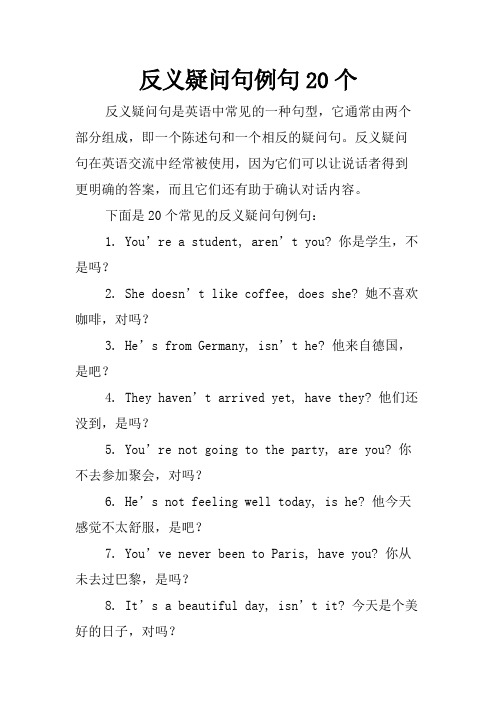
反义疑问句例句20个反义疑问句是英语中常见的一种句型,它通常由两个部分组成,即一个陈述句和一个相反的疑问句。
反义疑问句在英语交流中经常被使用,因为它们可以让说话者得到更明确的答案,而且它们还有助于确认对话内容。
下面是20个常见的反义疑问句例句:1. You’re a student, aren’t you? 你是学生,不是吗?2. She doesn’t like coffee, does she? 她不喜欢咖啡,对吗?3. He’s from Germany, isn’t he? 他来自德国,是吧?4. They haven’t arrived yet, have they? 他们还没到,是吗?5. You’re not going to the party, are you? 你不去参加聚会,对吗?6. He’s not feeling well today, is he? 他今天感觉不太舒服,是吧?7. You’ve never been to Paris, have you? 你从未去过巴黎,是吗?8. It’s a beautiful day, isn’t it? 今天是个美好的日子,对吗?9. He can’t swim, can he? 他不会游泳,对吗?10. She doesn’t like pizza, does she? 她不喜欢披萨,对吗?11. You’re not afraid of heights, are you? 你不怕高,对吗?12. They won’t be able to attend the meeting, will they? 他们不能参加会议,对吗?13. They’re leaving tomorrow, aren’t they? 他们明天要走了,对吗?14. He’s never been skiing, has he? 他从未滑过雪,对吗?15. She’s not going to the concert, is she? 她不去音乐会,对吗?16. You’re not worried about the exam, are you? 你不担心考试吧,对吗?17. He didn’t eat breakfast this morning, did he? 他今天早上没吃早餐,对吗?18. They’r e not going to the beach, are they? 他们不去海边,对吗?19. You’ve already seen the movie, haven’t you? 你已经看过这部电影了,对吗?20. He’s not coming to the party, is he? 他不来参加聚会,对吗?在使用反义疑问句时,需要注意的是,它们并不总是表示对话者的不确定或疑虑。
反义疑问句的14种常考特殊用法
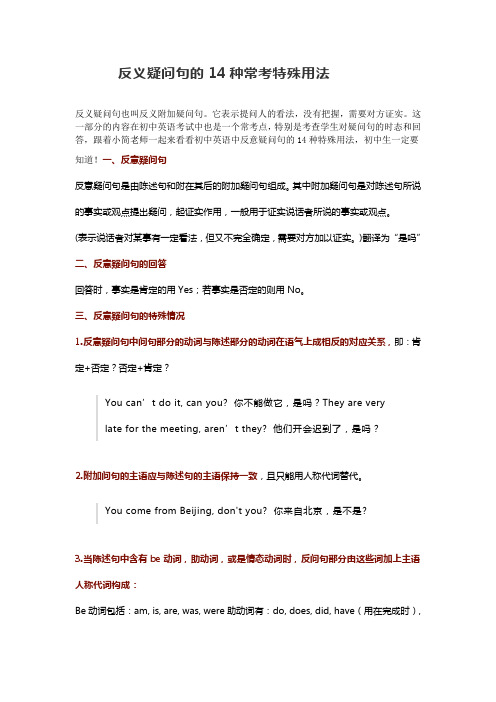
反义疑问句的14种常考特殊用法反义疑问句也叫反义附加疑问句。
它表示提问人的看法,没有把握,需要对方证实。
这一部分的内容在初中英语考试中也是一个常考点,特别是考查学生对疑问句的时态和回答,跟着小简老师一起来看看初中英语中反意疑问句的14种特殊用法,初中生一定要知道!一、反意疑问句反意疑问句是由陈述句和附在其后的附加疑问句组成。
其中附加疑问句是对陈述句所说的事实或观点提出疑问,起证实作用,一般用于证实说话者所说的事实或观点。
(表示说话者对某事有一定看法,但又不完全确定,需要对方加以证实。
)翻译为“是吗”二、反意疑问句的回答回答时,事实是肯定的用Yes;若事实是否定的则用No。
三、反意疑问句的特殊情况1.反意疑问句中问句部分的动词与陈述部分的动词在语气上成相反的对应关系,即:肯定+否定?否定+肯定?You can’t do it, can you? 你不能做它,是吗?They are verylate for the meeting, aren’t they? 他们开会迟到了,是吗?2.附加问句的主语应与陈述句的主语保持一致,且只能用人称代词替代。
You come from Beijing, don't you? 你来自北京,是不是?3.当陈述句中含有be动词,助动词,或是情态动词时,反问句部分由这些词加上主语人称代词构成:Be动词包括:am, is, are, was, were助动词有:do, does, did, have(用在完成时),has(用在完成时)等情态动词有:can, could, may, might, must, will, would, shall, shouldHe will go home, won’t he? 他要回家了,是吗?She doesn’tlike to eat popcorn, does she? 她不喜欢吃爆米花,是吗?4.have的不同用法,反义疑问句用不同的动词(1)have 表“有”时,反义疑问句谓语动词用have/do都行He has a new car, doesn’t/hasn’t he?(2)have表“吃,喝,玩,度过,举办”等是,反义疑问句谓语动词用doHe has supper at home every day, doesn’t he?They had agood time in Beijing, didn’t they?(3)have to表“不得不,必须”时,反义疑问句谓语动词用doKite has to help her mother, doesn’t she?(4)had better表“最好”时,反义疑问句谓语动词用hadWe had better go to school at once, hadn't we?(5)have用在完成时中,反义疑问句谓语动词用haveThey have known the matter, haven’t they?5.(1)反意疑问句的陈述部分带有little, few, never, hardly, seldom,nobody, nothing, no one, none, neither等否定意义的词时,问句部分用肯定式。
反义疑问句
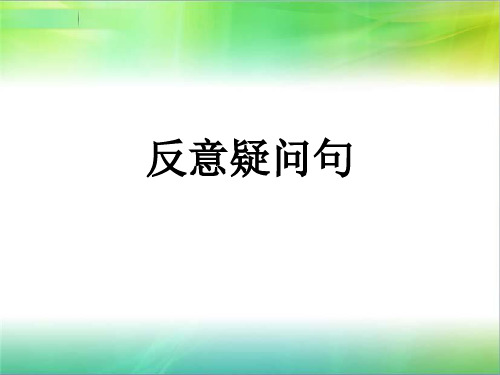
结构
• 反意疑问句是由两部分组成的,前一部分是对事 物的陈述(即陈述句),后一部分是简短的提问 (即简短疑问句),中间用逗号隔开。 • 如果前一部分用肯定句,后一部分就用否定疑问 句;如果前一部分用否定句,后一部分就用肯定 疑问句,也就是所谓的“前否后肯”、“前肯后 否”。两部分的人称和时态要一致。 • 其回答是用yes或no来表示
1: 主+行为V.+其它,don’t /doesn't/didn't +主
You sing very well, don't you?
She speaks English very well, doesn't she?
It rained yesterday, didn't it?
2:
主+
d o n ’ t /doesn't/didn/t + V. 原 形 + 其 它
,do/does/did+主 You don't like playing basketball, do you? She doesn't want to go to the park, does she?
一、含be(is, are, was, we+ be+其它,isn't/aren't/wasn't/weren't+ 主?
Eg .She is so beautiful, isn't she?
2. 主+ be not+其它,is/are/was/were+ 主? Eg .You aren't a student, are you?
反义疑问句知识点

反义疑问句反义疑问句:在陈述句后附加一个简短的疑问句,可以表示疑问,也可以表示说话者的某种倾向,强调或反问。
反义疑问句通常由两个词组成:第一个词是be、情态动词、助动词;若为否定,not用简略形式。
第二个词是人称代词主格(与陈述句主语相同)。
例:……,can't we? 和……,can we?⑴一般情况下:前面陈述句是肯定句,后面反义疑问句部分用否定;即“前肯定后否定,前否定后肯定”。
⑵当陈述句部分有表示否定或部分否定意义的词如little,barely,hardly,rarely,scarcely,seldom,few,no,never,nothing,not等词时,反意疑问句部分要用肯定形式。
You can hardly blame Tom for leaving early, can you?你不能责怪汤姆提前离开,是吗?当陈述句部分中表示否定意义的词为含有im-,in-,dis-,un-等否定前缀或-less等否定后缀的词时,应把陈述句部分视为肯定句,反意疑问句部分要用否定形式。
(有否定意义,但不能算否定词)Tom dislikes the book,doesn't he? 汤姆不喜欢这本书,是吗?⑶陈述句主语不同情况①当陈述句部分的主语是everyone,someone,anyone,no one,everybody,somebody,anybody,nobody等表示人的不定代词时,反意疑问句部分的主语通常用he,但口语多用they;Nobody wants to go here,does he/do they?没有人想去那里,是不是?②当陈述句部分的主语是anything,everything,nothing,something 等表示物的不定代词时,反意疑问句部分的主语常用it.Everying seems all right now,doesn't it?似乎一切顺利,是不是?②当陈述句部分的主语是I 时,反意疑问句部分的主语常用aren't I.若表示征询对方意见时,疑问句部分用do you.I am healthy,aren't I?我很健康,对吗?I don't like this film,do you?我不喜欢这部电影,你呢?④当陈述句部分的主语是不定式(短语)或动名词(短语)时,反意疑问句部分的主语常用it.Learning English well takes a long time,doesn't it?学好英语需要好长时间,是不是?②当陈述部分的主语是指示代词this /that或these /those时,疑问句中的主语分别用it或theyThis is important, isn't it? 此事很重要,是不是?②如果陈述部分是以代词one作主语疑问句的主语,在正式场合用one 非正式场合用you在美国英语中非正式场合下,还可以用heOne cannot be too careful, can one /can you? 越仔细越好,对不对?②陈述部分有neither…nor 或both …and连接两个主语时,疑问句部分的主语常用复数形式。
反义疑问句(最全)
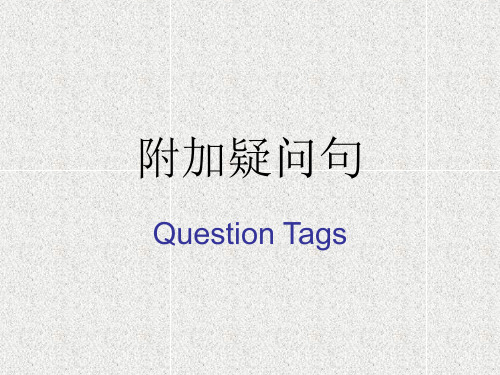
5.陈述部分有would rather +v.,疑问部分多用 wouldn’t +主语。 He would rather read it ten times than recite it, wouldn’t he? 6.陈述部分有you’d like to +v. 疑问部分用wouldn’t + 主语。 You’d like to go with me, wouldn’t you? 7.陈述部分是“there be”结构时,疑问部分用there省 略主语代词。 There is something wrong with your watch, isn't there? There will not be any trouble, will there? Note: 当为“ there used to be…”句型时,反意问句用 didn’t there。
b. 带有定语从句,宾语从句的主从复合句,疑问部分谓 语根据主句的谓语而定 He is not the man who gave us a talk, is he? He said he wanted to visit Japan, didn’t he?
c. 上述部分主句是由谓语think, believe, expect, suppose, imagine等引导的宾语从句,疑问部分与宾语 从句相对应构成bright, is he? We believe she can do it better, can't she? Note: 但此时主语必须是第一人称。如果不是,则不能否定从 句。 He thought she was wrong, didn't he? 而不能说wasn't she?
a 表示肯定推测 (一)句中陈述部分没有表示过去的时间状语,这时疑问 部分中的动词就用现在完成时。 (haven’t / hasn’t + 主语) You must have told her about it, haven’t you?
英语反意疑问句

英语反意疑问句反意疑问句是一种特殊的疑问句,其结构为:“陈述句+反意疑问句的转折连接词+反义疑问句”,用于表示对某一观点的质疑或确认。
下面是关于英语反意疑问句的相关内容。
一、反意疑问句的概述反意疑问句是用于询问或肯定对方对陈述的观点的一种问句。
其结构为“陈述句+反意疑问句的转折连接词+反义疑问句”。
反意疑问句的转折连接词有常用的有"but"、"though"、"yet"、"still"等。
反意疑问句一般用于英语口语中,使得对话更加自然流畅。
二、反意疑问句的用法1. 反面认同:对一个肯定的事实提出质疑。
例如:"You went to the party last night, didn't you?"2. 正面疑问:对一个否定的事实提出确认。
例如:"You don't like coffee, do you?"3. 意见确认:对对方的意见进行确认。
例如:"You think it's going to rain today, don't you?"4. 邀请确认:表示邀请的疑问。
例如:"Let's go for a walk, shall we?"三、反意疑问句的语气反意疑问句的语气可以根据情境和语调来调整。
积极的反意疑问句用于表示请求或请求对方的肯定回答,例如:"You'll help me, won't you?" 消极的反意疑问句用于表示期待否定回答或表示对方的斥责,例如:"You didn't do your homework again, didyou?"四、反意疑问句的注意事项1. 反意疑问句通常是在对话中使用,不适用于正式文体。
反义疑问句(含解析、例句及详尽用法)

反义疑问句(含解析、例句及详尽用法)-CAL-FENGHAI.-(YICAI)-Company One1反义疑问句一、祈使句的反义疑问句1、肯定祈使句Will you/won’t you2、否定祈使句Will you3、Let的祈使句Let us ...,will you(此处Let us 表示“允许我们...”)Let’s...,shall we (此处Let’s表示“让我们...吧”)Let + 第三人称...,will you二、Must的反义疑问句1、表示“必须” musn’t /needn’tEg. You must go now, needn’t you2、表示“不准”Eg. You musn’t smoke here, must/may you3、表示推测,肯定。
(I’m sure + 从句)Eg. You must be hungry now, aren’t youI’m sure you are hungry now, aren’t youShe must have heard about that, hasn’t sheI’m sure you have heard about that, haven’t youYou must have watched that movie last night, didn’t you(last nigh为具体时间点,所以用一般过去式)三、主语(反义疑问句)+从句主句:I(don’t)think/believe/consider/suppose 或 I’m afraid/sure...后跟从句时,可将从句部分进行反义疑问Eg. I don’t think he will win, will heI think he will win, won’t heShe thinks he will win, doesn’t she(当主句主语不是I时不适用于该用法,此句中的翻译疑问针对的是主句而非从句)四、当句中包含有表示否定意义的副词或不定代词时,反义疑问句用肯定形式Eg. Nothing happened to him, did itIt is unfair, isn’t itHe dislikes watching TV, doesn’t he(该句中含否定意义的是动词而非副词或不定代词,因此不适用于该用法,反义疑问句仍然使用否定形式)五、反义疑问句的回答反义疑问句的回答针对被提问部分的谓语动词,且与回答句前部分的Yes和No 保持一致Eg. A: You haven’t lost the ticket, have youB: D I know it’s hard to get another one at this moment.A. Yes, I haven’tB. No, I haveC. I hope soD. I’m afraid not六、陈述部分的主语与反义疑问句主语保持一致的情况1、OneEg. One can’t be too careful when driving a car, can one/he一个人在开车的时候再怎么小心也不为过。
(完整版)英语语法:反义疑问句专项讲解
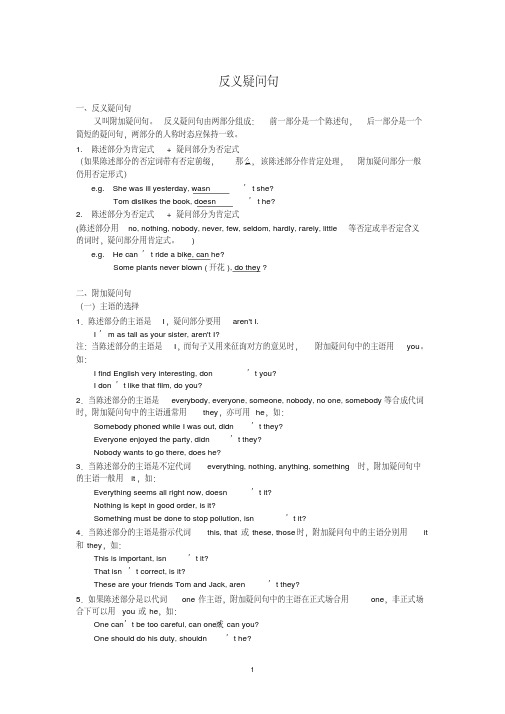
反义疑问句一、反义疑问句又叫附加疑问句。
反义疑问句由两部分组成:前一部分是一个陈述句,后一部分是一个简短的疑问句,两部分的人称时态应保持一致。
1.陈述部分为肯定式+ 疑问部分为否定式(如果陈述部分的否定词带有否定前缀,那么,该陈述部分作肯定处理,附加疑问部分一般仍用否定形式)e.g. She was ill yesterday, wasn’t she?Tom dislikes the book, doesn’t he?2.陈述部分为否定式+ 疑问部分为肯定式(陈述部分用no, nothing, nobody, never, few, seldom, hardly, rarely, little等否定或半否定含义的词时,疑问部分用肯定式。
)e.g. He can’t ride a bike, can he?Some plants never blown (开花), do they ?二、附加疑问句(一)主语的选择1.陈述部分的主语是I,疑问部分要用aren't I.I’m as tall as your sister, aren't I?注:当陈述部分的主语是I,而句子又用来征询对方的意见时,附加疑问句中的主语用you。
如:I find English very interesting, don’t you?I don’t like that film, do you?2.当陈述部分的主语是everybody, everyone, someone, nobody, no one, somebody等合成代词时,附加疑问句中的主语通常用they,亦可用he,如:Somebody phoned while I was out, didn’t they?Everyone enjoyed the party, didn’t they?Nobody wants to go there, does he?3.当陈述部分的主语是不定代词everything, nothing, anything, something时,附加疑问句中的主语一般用it,如:Everything seems all right now, doesn’t it?Nothing is kept in good order, is it?Something must be done to stop pollution, isn’t it?4.当陈述部分的主语是指示代词this, that或these, those时,附加疑问句中的主语分别用it 和they,如:This is important, isn’t it?That isn’t correct, is it?These are your friends Tom and Jack, aren’t they?5.如果陈述部分是以代词one作主语,附加疑问句中的主语在正式场合用one,非正式场合下可以用you或he,如:One can’t be too careful, can one?或can you?One should do his duty, shouldn’t he?6.当陈述句为there be结构时,附加疑问句中的主语也用there。
反义疑问句
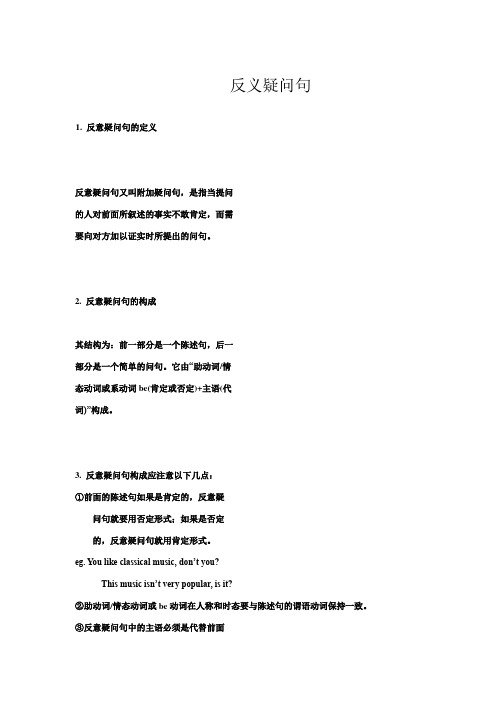
反义疑问句1. 反意疑问句的定义反意疑问句又叫附加疑问句,是指当提问的人对前面所叙述的事实不敢肯定,而需要向对方加以证实时所提出的问句。
2. 反意疑问句的构成其结构为:前一部分是一个陈述句,后一部分是一个简单的问句。
它由“助动词/情态动词或系动词be(肯定或否定)+主语(代词)”构成。
3. 反意疑问句构成应注意以下几点:①前面的陈述句如果是肯定的,反意疑问句就要用否定形式;如果是否定的,反意疑问句就用肯定形式。
eg. You like classical music, don’t you?This music isn’t very popular, is it?②助动词/情态动词或be动词在人称和时态要与陈述句的谓语动词保持一致。
③反意疑问句中的主语必须是代替前面主语的代词。
还要注意:①陈述句部分如果含有否定意义的词(nothing,no,nobody hardly, never,little, few,seldom等),反问句要用肯定式。
He has nothing left, __?They have never been to school, _____?He hasn’t got any apples,_____?He doesn’t have any apples, ____?He has little apples,_______? (仔细思考have/has 在句子中是助动词还是实义动词)答案:1. doeshe 2. have they 3. has he 4. does he 5. does he②当句子为祈使句时,反问句一般用will you。
Drive more slowly, will you?Speak loudly, _____?Don’t smoke, _____?Let us go home, ______?当祈使句为Let’s…结构时,则用shall we。
Let’s go to the cinema, shall we?我们去看电影,好吗?当陈述部分的主语是(1)用one时,用one/he.(2)this, that,或those, these时,用it或they. (3)everything,anything,nothing,something时,用it 不用they(4)everyone,everybody,someone,somebody,anyone,nobody等,用he/they(5)不定式to do ,动名词doing,其他短语,用it。
英语反义疑问句最全解析

反义疑问句1)“am I”的否定形式是“aren’t I”,而不是“am not I”或“amn’t I”。
例如:I am right, aren’t I?2)everything和nothing作为陈述句的主语时是单数,因此反意疑问句中的主语要用“it”。
注意,nothing作为主语时,反意疑问句中的动词要用肯定形式。
例如:Nothing is wrong, is it?3)陈述句中的主语为everyone, everybody, anyone, nobody或no one时,反意疑问句中的主语用they。
注意,nobody和no one是否定词,因此反意疑问句应该用肯定的。
例如:Nobody knows it, do they?4)如果陈述句部分有no, never, hardly, scarcely, rarely, seldom等词,那么,陈述句本身就是否定的,所以要接一个肯定的反意疑问句。
例如:He has never been there, has he?5)如果陈述句中的动词是“wish”,那么反意疑问句中要用“may”。
例如:I wish to go there with you, may I?6)包括听话人在内时“let’s”的反意疑问句要用“shall we”。
反之,反意疑问句中要用“will you”。
例如:Let’s go, shall we?Let us go, will you?全真模拟试题1. All of the plants now farmed on a large scale were developed from plants ____ wild.A. that once growB. once they growC. they once grewD. once grew2. By the time you graduate, we ____ in Australia for one year.A. will be stayingB. will have stayedC. would have stayedD. have stayed3. He appreciated ____ the chance to deliver his thesis in the annual symposium on Comparative Literature.A. having givenB. to have been givenC. to have givenD. having been given4. The government official can hardly find sufficient grounds ____his arguments in favor of the revision of the tax law.A. on which to baseB. which to be based onC. to base on whichD. on which to be based5. Living in the desert involves a lot of problems, ____water shortage is the worst.A. not to mentionB. of whichC. let aloneD. for what6. Hydrogen is one of the most important element in the universe ____ it provides the building blocks from which the other elementsare produced.A.so thatB. but thatC. provided thatD. in that7. Just as relaxation is an important part of our lives, ____stress.A.so isB. as it isC. and so isD. the same is8. Victor took a bus and headed for home, ____ if his wife would have him back.A. not to knowB. not knownC. not knowingD. not having known9. We can make an exception ____.A. in any case of JohnB. in case of JohnC. in case of John’sD. in the case of John10. When the Cultural Revolution was launched in China, his father ______ college.A. attendedB. had been attendingC. was attendingD. has been attending11. My cat is a fussy eater, but my dog is so ____ that she’ll swallow down anything that is put in front of her.A. indiscriminateB. choosyC. indefiniteD. picky12. “This house is more ____than the federal government!” Mac complained to his parents. “You have rules for everything.”A. systematicB. democraticC. bureaucraticD. public试题答案与解析1. A)【句意】大规模种植的农作物都繁衍于野生植物。
反义疑问句

特殊的反义疑问句1.Sit down and have a cup of tea ,will you? \ won't you ?Don't be late again, will you ?2.Let's have a rest, shall we? \ shan't we? \ OK?Let us go home now, will you? \won't you?Let meLet him3.What a beautiful girl ,isn't she ?4.I'm quite tall, aren't I?5.Something is wrong with my radio, isn't it?Nothing is serious, is it ?6.Everybody likes Beijing, don't they?Nobody wants to go swimming , does he ? \ do thay ?Neither of them is right, is he ? \ are they ?7.This is my ruler, isn't it ?Those are their books , aren't they ?8.One should do one's duty, shouldn't one?One cannot always do one's duty , can you ?9.What you need is more practice, isn't it ?To learn English well isn't easy ,is it ?Swimming is great fun, isn't it ?10.I wish to go home ,may I ?I wish I were you , may I ?11.He said that it was worth doing ,didn't he ?She said that her father had gone to America , didn't she ?I think he will be back in an hour , won't he ?I don't suppose you are serious , are you ?12.We must study English hard or we can't be good at it , can we ?He is a teacher but his wife is a nurse , isn't she ?13 当must 表示“必须”时,He must work hard next term , mustn't he ?当must 表示“必要”时,They must renew the books , needn't they ?当must 表示“推测”时,She must be very tired , isn't she ?You must have been to Huangshan ,haven't you ?14.You'd better come back early ,hadn't you ? \ shouldn't you ?You'd like to go there , wouldn't you ?You'd rather15.--Tom told me he saw a ghost last night ?-- He did , did he ?-- You mustn't listen to his story .-- Oh , I mustn't , mustn't I ?主谓一致一,谓语动词用单数1.either, neither ,one ,each (of) ,every (of) ,作主语或修饰主语时E.g. Every silver knife ,fork ,spoon has to be counted .2. everybody ,everyone ,everything ,no one ,no body ,anyone等不定代词,what ,whoever 等作主语3.不定式,动名词,从句作主语时谓语动词单数To see is to believe .Singing and dancing are their greatest pleasure .4.国家,机构,书刊,事件名称等作主语:The United Nations was founded in 1945.5.并列主语指同一事物时Ice cream and cake is what she wants after dinner .6.many a + 单数名词(表示许多)Many a student wants to apply for the scholarship .7.mathematics ,measles ,physics ,politics ,news二.谓语动词用复数1.both, few, many, several ,a number of ,the majority of 作主语或修饰主语2.用and 或both...and...连接的两个不同事物The manager and the secretary of the firm are very able man .The editor and publisher of the newspaper is a very able man .3.某些集合名词:few ,people ,the rest ,cattle ,police 等作主语4.正式语中,one of those + 复数名词+ 定从(谓语复数) Jane is one of those persons who always think they are right.the only one of +单数名词+ 定从(谓语单数)三.谓语动词有时单数有时复数1.a good many ,a number of + 复数名词a good deal + U2.family ,army ,class ,crowd ,herd ,public ,group, party ,committee, company ,government ,team等表整体--单数表成员--复数Class 2 is having English class . Class 2 are playing on the sports ground.3.Chinese ,Japanese ,English , French 指语言-- 单数指人民-- 复数4.时间,金钱,距离,体积等作主语---V.单数Twenty dollars is too expensive .表具体的、个别的单位--复数The last two years have been very difficult for us .真题1.In the coming summer holidays,my family ___ going to take a one-week trip to Qingdao.A.isB.areC.wasD.were2.___ pretty your dress is !Where did you get it ?A.HowB.How aC.WhatD.What a3.--There is enough food for the birds ,isn't ____?--No. We need to get some.A.itB.thereC.thatD.this4.--Your monitor id never late for school , is he ?--____.He always comes to school earlier than others .A.Yes ,he is .B.No,he isn'tC.Yes,of courseD.No,sometimes5.--_____ ?--He thinks China is great .A.What does your father think of China ?B.What does your father like in China ?C.Does your father like China ?6.--The film "Hoot"(拯救猫头鹰)is on at the movies .Let's go to see it ,____?--Ok. Let's go .A.will youB.shall weC.won;t weD.don;t you7.Lily is away .She ,with her mother ,____ to Zhalong to see birds .A.has goneB.have goneC.has been8.-- How many teachers are there in your school ?-- About 200. One third of them ___ men teachers.A.haveB.hasC.areD.is9.In our school library there ___a number of books on science and the number of them___growing larger and larger .A.is; areB.are; isC.has ;isD.have ;are10.Nothing is difficult in the world if you put your heart into it ,_____?A.aren't theyB.isn't itC.are theyD.is it。
- 1、下载文档前请自行甄别文档内容的完整性,平台不提供额外的编辑、内容补充、找答案等附加服务。
- 2、"仅部分预览"的文档,不可在线预览部分如存在完整性等问题,可反馈申请退款(可完整预览的文档不适用该条件!)。
- 3、如文档侵犯您的权益,请联系客服反馈,我们会尽快为您处理(人工客服工作时间:9:00-18:30)。
反义疑问句一、英文中的反意疑问句。
1、什么是反意疑问句英语中,反意疑问句是由陈述句和附在其后的附加疑问句组成。
其中附加疑问句是对陈述句所说的事实或观点提出疑问,起证实作用,一般用于证实说话者所说的事实或观点。
翻译为“是吗”2.反意疑问句的回答,回答时,如果情况属实,用Yes加上反问句的倒装肯定句;若果情况不属实,则用No加上反问句的倒装否定句。
例如Connie is a beautiful girl, isn’t she?情况属实:Yes, she is..情况不属实:No, she isn’t.二、反意疑问句中问句部分的动词与陈述部分的动词在语气上成相反的对应关系,即:肯定+否定?否定+肯定?三.当陈述句中含有be动词,助动词,或是情态动词时,反问句部分由这些词加上主语人称代词构成,Be动词包括:am, is, are, was, were助动词有:do, does, did, have(用在完成时), has(用在完成时)等情态动词有:can, could, may, might, must, will, would, shall, should例如:She is a lovely girl, isn’t she?她是一个可爱的女孩,是吗?He will go home, __won’t__ __he__?他要回家了,是吗?She doesn’t l ike to eat popcorn, __does__ _she___?她不喜欢吃爆米花,是吗?The baby won’t sleep early, will it?小宝宝睡得不早,是吗?注意:①He has supper at home every day,doesn’t’t he? (不能用hasn’t he?)他每天在家吃晚饭,是吗?①They have known the matter, haven’t they? (不能用don’t they?)他们已经知道那事情了,是吗?四.当陈述句中只含有行为动词时,若动词加了s,就用does, 若动词为原形,就用do,动词为过去式,则用did,例如:You cleaned your house last week, _didn’t___ __you__?你上周打扫了你的房间,是吗?Your father plays the computer very well, __doesn’t__ ___he _?你父亲电脑技术很好,是吗?They look so happy today, _don’t ___ _they___?你今天看起来很高兴,是吗?五.反意疑问句的陈述部分带有little, few, never, hardly, seldom,nobody, nothing, barely, scarcely等否定意义的词时,问句部分用肯定式。
如:①She never tells a lie, does she?(不用doesn’t she?)她从不说谎,是吗?②He was seldom late, was he?(不用wasn’t he?)他几乎不迟到,是吗?六、反意疑问句的陈述部分为I am……时,问句部分习惯上用aren’t I?表示。
如:I am a very honest man, aren’t I?我是个很诚实的人,是吗?七.陈述部分的主语为不定代词something, anything, nothing, everything时,问句部分的主语用it。
如:①Something is wrong with the computer, isn’t it?电脑有问题了,是吗?②Nothing has happened to them, has it?他们什么事也没发生,是吗?八、陈述部分的主语为不定代词somebody (someone), anybody (anyone), nobody (no one), everybody (everyone)时,问句部分的主语用he或they,这时问句动词的数应和he或they 一致。
如:①Someone has taken the seat, hasn’t he?有人已经坐了位置,是吗?②Everyone has done their best in the game, haven’t they?每个人在比赛中已经尽力了,是吗?九.陈述部分为祈使句1)若为let’s引导,反问句用shall we? 例如Let’s go home together, shall we? 让我们一起回家,好吗?2)若为let us引导和其余的任何一般的否定祈使句,都用will you, 例如Let us stop to rest, will you? 让我们停下休息,好吗?Don’t make any noise, will you?别弄出噪音,好吗?3)一般的肯定祈使句则用will you 或won’t you 都行,例如:Do sit down, won’t you?/ will you? 请坐,好吗?You feed the bird today, will you? 今天你喂鸟,是吗?Please open the window, will you? (won’t you?) 打开窗,好吗?十:陈述部分为There (Here) + be + 主语时,问句部分用动词+there (here)?形式。
①There are two cakes on the plate, aren’t there?碟子里有两块蛋糕,是吗?②Here is a story about Mark Twain, isn’t here?这是关于马克吐温的故事,是吗?反义疑问句练习题目:1. Linda ate nothing this morning, ___?A. didn’t sheB. was sheC. did sheD. wasn’t she2. There’s hardly___ milk in the bottle, _____there?A. no, isn’tB. some, isC. little, isn’tD. any, is3. He has never ridden a horse before, ___?A. does heB. has heC. hasn’t heD. doesn’t he4. — He seldom came here, _____? — Yes sir.A. didn’t heB. does heC. doesn’t heD. did he5. Everything seems all right, _____ ?A. does itB. don’t theyC. won’t itD. doesn’t it7. One can’t be too modest, can _____ ?A. oneB. heC. itD. we8. No one failed in the exam, _____ ?A. was heB. did oneC. did theyD. didn’t he10. Neither you nor I am a artist, _____ ?A. am IB. aren’t weC. are weD. ain’t I11. He can’t be her father, _____ he?A. isB. isn’tC. canD. can’t12. They have no time to visit the museum, _____?A. do theyB. haven’t theyC. don’t theyD. will they14. You’d better go at once, _____ you?A. hadn’tB. didC. didn’tD. don’t15. You’d rather work than play, _____ you?A. hadn’tB. wouldn’tC. didn’tD. mustn’t16. You dare not do that, _____ you?A. don’tB. doC. dareD. daren’t18. He dislikes the two subjects, _____ he?A. doesB. doesn’tC. isD. isn’t19. These tools are useless now, _____ ?A. are theyB. aren’t theyC. is itD. isn’t it20. He used to get up at 6:30, _____ he?A. didn’t heB. did heC. used heD. wouldn’t he22. He ought to win the first prize, _______ he?A. mustn’tB. oughtn’tC. shouldn’tD. Both B and C.23. Let’s go there by bus, ___?A. will youB. shall weC. don’t youD. will you24. Let us go to play football, ___?A. will youB. shall weC. do weD. are we25. Don’t forget to give Polly some food and change her water, ___?A. will youB. shall weC. won’t youD. do you26. —Let’s go shopping this afternoon, _____? — All right.A. will weB. shall weC. don’t weD. are we27. — Pass me the dictionary, _____? — Yes, with pleasure.A. would youB. will youC. won’t youD. wouldn’t you30. There is little water in the glass, ____?A. isn’t thereB. isn’t itC. is itD. is there32. There won’t be any concert this Saturday evening, _____ ?A. will there notB. will thereC. is thereD. won’t33. — I guess she taught herself Japanese, ______? — Yes.A. don’t IB. did sheC. do ID. didn’t she34. I don’t believe you are right, _____ ?A. are youB. do youC. won’t youD. do35. She doesn’t think that Tom sings best in the class, _____ ?A. does sheB. doesn’t sheC. does heD. doesn’t he37. I know you didn’t want to hurt me, _____ ?A. did youB. didn’t youC. do ID. don’t I38. If my father were here he would be very happy, _____ ?A. weren’t heB. were heC. wouldn’t heD. would heKey: 1—5 CDBDD 6—10 BACDC 11—15 AABAB 16—20 CCBBA 21—25CDBAA 26—30 BBB AD 31—35 BBDAA 36—38 AAC反义疑问句和感叹句专练 2EX II: Complete the tag questions.1. You aren’t in this school ,___________________?2. They don’t study science at school, __________________?3. It isn’t Monday today, _______________?4. The old man can’t look after himself, ______________?5. Your mother doesn’t teach maths, _______________?6. Miss Gao won’t leave tonight, _______________?7. I’m not in Row Three, __________________?8. The singer didn’t give a concert in 2000, ______________?9. They weren’t in Guangzhou last week, _______________?10. Jim couldn’t swim at the age of five, _________________?EX III: Complete the tag questions.1. That is an interesting film , _______________?2. Come to the front, ________________?3. There is nothing in the box, ________________?4. Let’s go boating next week, __________________?5. These are apple trees, ___________________?6. You never read his books, ________________?7. There was a concert in the theatre last night, _______________?8. Let us go to the farm together, _________________?9. The boy is no longer a waiter in the hotel , ________________?10. Please answer my questions, __________________?11. There was nobody in the house, ________________?12. His mother never goes to Tibet, _________________?13. This is very interesting, _________________?14. He found nobody around the farm, ___________________?15. Let’s go on a field trip, ________________?16. There are some children playing at the zoo, __________________?17. Mr. Yang knew few Chinese when he was in USA, ______________?18. There was little meat in the fridge, ___________________?19. Let me have a look, ___________________?20. They had no time to do the work, ________________?初中反意疑问句练习(含答案)完成下列反意疑问句1、You're in Grade two now,_____________?2、Your father is a worker,________________?3、Mary is going to study Chinese,_____________?4、We're going to have a meeting this week,______________?5、Jack is playing in the garden,_____________?6、They all look fine,____________?7、You like English,_____________?8、Kate swims the best in her class,____________?9、Mike watches TV every day,_______________?10、They like spring best,_________________?11、They won't have a good time,_______________?12、He will go to see a film,_________________?13、She isn't going to buy a book,______________?14、Tom and Mike are watching TV,_____________?15、You are doing some washing,______________?16、Mrs White is cleaning the room,______________?17、I bad a rest a moment ago,_______________?18、He was a teacher a year ago,______________?19、They wrote letters last Sunday,_____________?20、Mr Smith made a table last year,_____________?21、Don't open the door,_______________?22、Let's go to school,________________?23、Listen to me,______________?24、There's little water in the rive,________________?25、The little girl can hardly read,______________?26、He has never been to Japan,______________?27、The students borrowed few English books from the library,__________?28、Kate made few mistakes in the exam,_______________?1、aren't you2、isn't he3、isn't she4、aren't we5、isn't he6、don't they7、don't you8、doesn't she9、does he 10、don't they 11、will they 12、won't he13、is she 14、aren't they 15、aren't you 16、isn't she17、didn't I 18、wasn't he 19、didn't they 20、didn't he21、will you 22、shall we 23、will you 24、is there 25、can she 26、has he 27、did they 28、did she。
